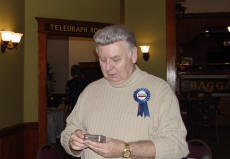|
At the end of his last day Ward
Brining was picked up in a 1956 car and taken to a party in his
honor at the Lincoln Depot. It was in 1958 that Brining was hired as
the 10th employee in the new plant. He walked into the plant
the day the company opened its doors on July 7 and began his new
career as a mailroom clerk.
As the years went by Brining
built his skills and became a valuable asset to his co-workers and
the company. In the 45 years from when he started, things changed a
lot.

He went from clerk in
the mailroom to key puncher in the tab department to information
technician in data processing, and when he retired he was in what is
now called information technology, working as systems analyst and
network administrator.
While Brining was always noted
as a good employee, IT manager Jan Taylor said that he was admired
for his good work ethic. "He was always there, no matter what,"
Taylor said.
Brining would lead with the
attitude "Let's just pitch in and get it done," and when problems
arose he would say, "Let's go on and get it finished."
One of his noted contributions
came in the early '90s as manufacturers across the country made a
shift in management style. The plant operated on a piece rate, where
employees came in and worked assembly lines doing one thing only
(piecework) and then punched a clock and went home.

[to top of second column in
this article] |

Cutler-Hammer then went to a
flat hourly rate with payroll and labor reporting. Brining helped
the transition by developing "cell work technology." In cell work
technology a group works as a team to increase the quantity and
quality of production. If someone is falling behind, rather than
hold everything up, the group is responsible to help them. They
watch out for one another and the production output. It is a team
effort.
Brining has a unique ability
that co-workers relied on for work decisions, and it gained him
favor socially. He can remember all kinds of information. He can
recall people's names, events, addresses, how something used to be
done, who did it, who moved where or bought what. "He was a stickler
for details," Taylor said. It made him a great resource person, and
people were always going to him even for little things because he
remembered everything.

Brining has always had work to
do away from work. He had six houses at one time that he was working
on refurbishing. Those houses were recently finished and put up for
sale. His future plans are to travel, see family (he's in Texas
doing that now) and to work on his yard.
Taylor said, "We're going to
miss having him around because he's always been here. We've seen so
many people come and go, but he's the last original employee. We're
definitely going to miss him."
Happy retirement, Ward Brining! It sounds like you've earned it.
[Jan
Youngquist]

|

